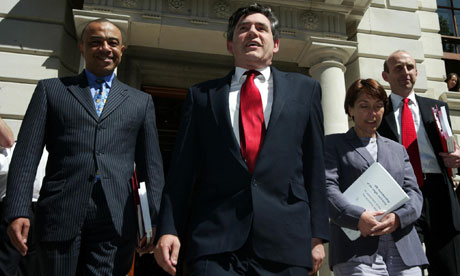If Gordon Brown had chosen to join the single currency 10 years ago, both the European Union and Britain would be stronger now

Gordon Brown with Paul Boateng and Dawn Primarolo in June 2003, just after his ‘not yet' decision on joining the euro. Photograph: Sean Smith for the Guardian
Ten years ago this week Gordon Brown said no to joining the euro. It is an anniversary on which Bank of England governor Mervyn King, Ukip's Nigel Farage, Unite's Len McCluskey and the Guardian's Larry Elliott, along with most of the British economic establishment, can all agree. On this, Brown was right.
Elliott set out the establishment consensus in a classic piece this month on his alternative history of what would have happened had Britain joined. Essentially, he says, there would have been a bigger boom in the runup to 2007 and a more disastrous bust. Britain would now be struggling to maintain its membership as anti-EU sentiment mushroomed, prompting its eventual exit, dramatising the inherent unsoundness of yoking disparate economies into one inflexible currency.
But there is a more optimistic, alternative history. The first obvious point is that Britain could have joined the euro only if a referendum had been won. A victory would have depended on it being an obvious good deal, with the pound entering at a competitive rate and the euro's structure, rules and governance reformed to accommodate British concerns and interests. The European Central Bank would have needed to look more like the US Federal Reserve, with more scope for fiscal and monetary activism. The Germans would doubtless have insisted, in return, that the EU banking system be more conservatively managed.
The last decade would have been very different. What none of the mockers of the euro ever acknowledge is the economic doomsday machine that Brown created through not joining. By not locking in a competitive pound, Britain suffered a decade of chronic sterling overvaluation, made more acute by the City of London sucking in capital from abroad to finance the extraordinary credit and property boom of those years.
Imports surged and exports sagged; the economy outside banking, which made goods and services to be sold abroad, either stagnated or shrank. Much of the best of UK manufacturing was auctioned off to foreigners. Today we find that, despite a huge currency devaluation, there are just not enough companies to take advantage of it: too much of the rest of British capacity, thanks to foreign takeover, has become a part of global supply chains that are indifferent to exchange-rate variation. Our export response has been feeble; evidence of the economic orthodoxy's inability to devise policies and structures that favour production.
Inside the euro, at a highly competitive exchange rate, Britain's exports would instead have soared, and its traded goods sector would have expanded, not shrunk. Regional cities would have boomed around sustainable activity rather than property and credit. The euro's rules would have meant a less reckless fiscal policy, and banks would have been more constrained in lending for property. They would have had to lend proportionately more to fast-growing real enterprise, reinforced because the new rules would have required them to lend in a more balanced way.
Britain would have entered the 2008 crisis with a far less unbalanced economy, a stronger banking system and international accounts, and a government deficit much less acute. And the reformed eurozone could have responded much more flexibly and cleverly than it did.
In any case, both Britain and Europe are now wrestling with depressed economic activity caused by overstretched bank and company balance sheets – and the exchange-rate regime is hardly the cause of this distress. Germany and the stronger EU countries are plainly wrong in their overemphasis on austerity as a solution, but surely right to argue that the only long-term solution is for the whole of Europe to move to their productivist, stakeholder capitalism.
British mainstream commentators see the obvious fissure between the stronger European north and the weaker south as proof positive that the euro is fatally flawed. But suppose countries like Greece or Ireland rise to the German challenge? Already there are encouraging auguries in both. If so, notwithstanding excessive austerity, they could weather the crisis, and become stronger.
There is plainly a chance one or more countries could leave, but there is a greater chance the system in some form will hold – it is in too many countries' interests to avoid failure. Then expect a pan-European recovery to begin in the second half of the decade that will gather strength in the 2020s.
Inside the euro for the last decade, the economic and political debate would have necessarily moved on. Having won a historic referendum decisively affirming Britain's future in Europe, the Blair government would have had to think in European terms about how to produce, invest, innovate and export. Sure, there would have been problems. But Britain outside the euro in 2013, with endless spending cuts, the biggest fall in real wages for a century, 500,000 people relying on food banks, and a weak unbalanced economy, is hardly a land of milk and honey.
Emboldened by his referendum victory, Blair could have sacked Brown before the disastrous second phase of his chancellorship and lacklustre prime ministership. Blairism would have morphed into a new form of European social democracy, fashioning British-style stakeholder capitalism. UK politics would not have moved so decisively to the right, with conservatives preaching free-market Thatcherism while the left clings to a bastard Keynesianism – united only in their belief, against all the evidence including Britain's export performance, that floating exchange rates are a universal panacea.
A single currency demands disciplines and painful trade-offs: but floating exchange rates after a financial crisis are a transmission mechanism for bank-runs and beggar-my-neighbour devaluations. Magic bullets do not exist. Had Britain joined, both we and Europe would have been better placed, and Larry Elliott would now be writing about how better to get Britain to innovate and invest under a fourth-term Labour government. A better world all round.




 377 Comments
377 Comments








